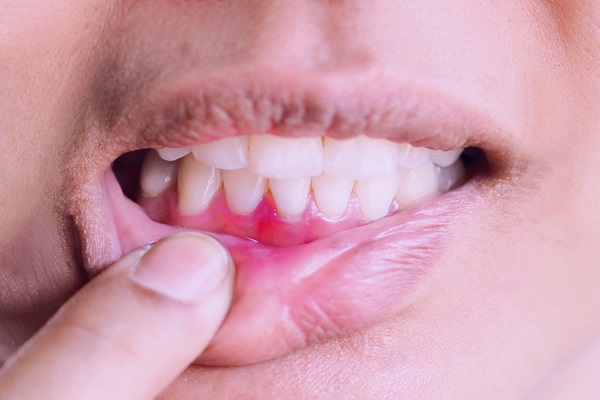Important FAQs About Gum Disease

Gum disease is very common in the United States, which often leads many to believe it is not as serious of a concern as it actually is. However, gum disease should be taken seriously, and learning more about it can help you determine why it is important to treat and prevent gum disease in order to maintain ideal oral health.
Gum disease FAQs
There are certain questions about gum disease that dentists often receive. These questions include insights into how gum disease develops, what the signs are, and how the disease can be prevented. This review discusses these questions and more and provides general answers from a dentist for each one.
What is gum disease?
Gum disease, also called periodontal disease, is a condition in which the gums and underlying jawbone become damaged by bacterial attacks. This causes the gums to weaken and become more susceptible to bleeding, discoloration, sensitivity, and erosion. Since gums and the jawbone (both of which are impacted by gum disease) are tasked with supporting teeth, this condition can contribute to the early loss of teeth if left untreated for an extended amount of time.
What are the different types of gum disease?
There are two primary types of gum disease: gingivitis and periodontitis. Both are serious and require treatment from a dental professional. However, periodontitis is a far more severe form of gum disease. In fact, gingivitis can develop into periodontitis if left untreated. Periodontitis displays more severe symptoms such as deep gum pockets, gum erosion, and loose (or lost) teeth.
How does gum disease develop?
Gum disease can develop from a variety of concerns. There are many aspects of oral hygiene, and a deficit in one area could significantly increase the likelihood of gum disease. In general, gum disease could be the result of an improper or irregular brushing and flossing routine, a diet that is high in carbohydrates (e.g., sugar), or infrequent visits to the dentist for a cleaning (or a combination of the three).
What are the early signs of gum disease?
The signs of gum disease can present differently for each patient. For many patients, the early signs of gum disease are gum discoloration, swollen gums, and gums that bleed while brushing. If these signs develop, then it is important to visit the dentist to find out why these symptoms occur. If the early symptoms of gum disease are ignored or not properly dealt with, then it could lead to more severe symptoms such as deep gum pockets, loss of bone inside the jaw, and gum recession.
What can I do to prevent gum disease?
Of course, the best way to deal with gum disease is to prevent it from developing in the first place. This can often be done by making smart dietary choices, practicing good oral hygiene (i.e. brushing and flossing regularly), and making all scheduled check-up visits. It is also helpful to check for the early signs of gum disease often and notify the dentist if they develop.
How does a dentist treat gum disease?
There are several ways a dentist can treat gum disease. The recommended treatment plan largely depends on the type and severity. The most common types of gum disease treatment include a prescribed mouth rinse, improvements in the patient’s oral care routine at home, dietary and lifestyle changes, and a dental cleaning. For periodontitis, a more severe form of gum disease, the dentist may recommend a deep dental cleaning (also called a scaling and root planing procedure). A gum graft or pocket reduction surgery may be necessary for treating gum recession and/or deep gum pockets that are caused by gum disease.
What can happen if gum disease goes untreated?
As discussed, untreated gum disease could lead to more severe symptoms. The ultimate result for many patients with gum disease is the loss of teeth. Before this occurs, patients could experience increased teeth sensitivity due to the exposure of tooth roots that result from deep gum pockets or gum recession. Bone loss in the jaw could also occur, which could make teeth replacement more challenging. Subsequently, patients are strongly encouraged to visit the dentist for regular check-up visits and cleanings.
Learn more about gum disease treatment and prevention
Here at our dental practice, we encourage our patients to come in once every four to six months for a check-up visit and dental cleaning. If it has been more than six months since your last cleaning visit, then contact our dental practice today to arrange a check-up and cleaning.
Are you considering gum disease treatment in the Castle Rock area? Get more information at https://www.foundersdental.com.
Check out what others are saying about our dental services on Yelp: Gum Disease in Castle Rock, CO.
Recent Posts
Gum disease treatment remains a cornerstone in modern dentistry and aims to preserve healthy gums, teeth, and underlying bone structure. This comprehensive approach protects oral health and prevents tooth loss by addressing plaque buildup and inflammation. Gum disease develops when plaque bacteria irritate the gum tissues, creating redness, swelling, and, if unchecked, progressive damage to…
Gum disease treatment plays a crucial role in maintaining oral health and preventing long-term dental complications. Dentists provide comprehensive care to address the symptoms of gum disease and restore gum tissue to optimal health. Here are five key benefits of seeking gum disease treatment from a professional dentist.Gum disease, particularly in its advanced stages, is…
Flossing can seem like a chore, but the link between flossing and bleeding gums is clear. Sometimes, when you floss, you might occasionally find it causes your gums to bleed. That does not mean that flossing is bad for you — but you may not be doing it properly. Frequent flossing is the solution to…
Gum disease attacks the healthy gum and bone structure in the mouth and in extreme cases can cause the teeth to fall out. Bleeding gums are an early warning sign of the infection, but unfortunately, many smokers, vapers, and tobacco chewers miss it. Because of this and other factors, smoking is a leading cause of…


